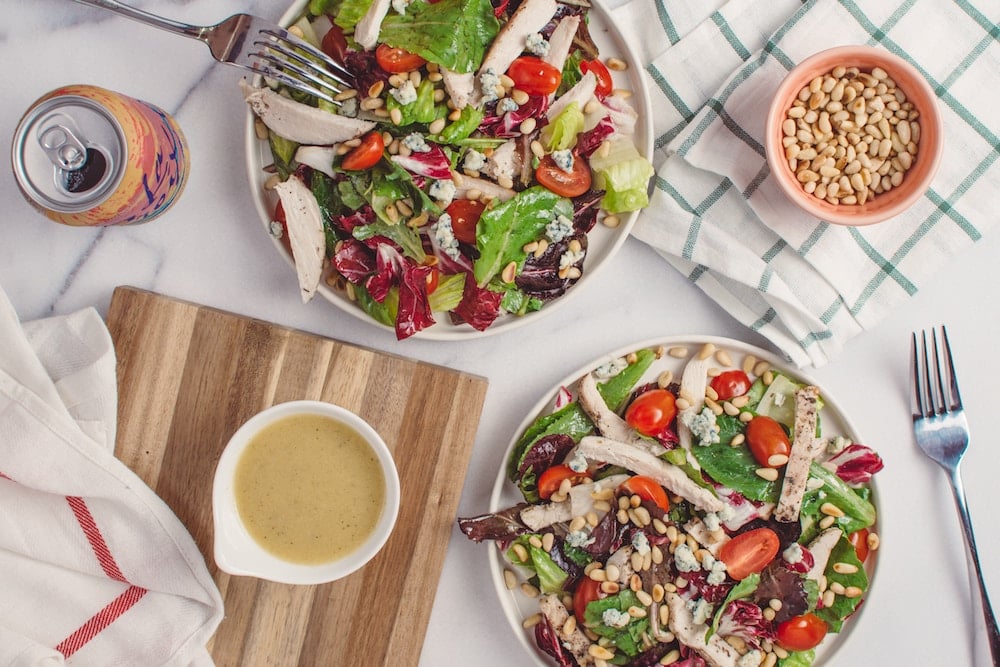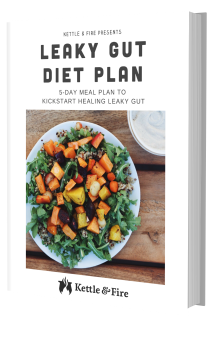How to Get Rid of Bloating: 8 Common Causes and Solutions
Bloating is a painful, stubborn symptom that can take a toll on your confidence and cause you to feel heavy, sluggish, and uncomfortable in your own skin. (Goodbye tight jeans and hello baggy sweaters and stretchy pants.) Whether you wake up feeling bloated, or it happens progressively throughout the day, there’s one thing you should know: bloating isn’t normal.
Despite that, approximately 15.3 million people suffer from irritable bowel syndrome, which includes symptoms such as bloating, constipation, cramping, acid reflux, and diarrhea. (1) And while each person’s microbiome (a fancy word for gut) is different and extraordinarily complex, bloating is the body’s way of communicating to you that something in your diet or lifestyle isn’t jiving.
With that said, there could be several different factors causing you to feel bloated, or there may be just one specific cause. Take a peek at these eight common culprits (and solutions) to see which one(s) may be causing your symptoms.
It almost sounds too simple, but feeling bloated after every meal could be the result of what you’re paying (or not paying) attention to.
Research shows that hunger isn’t the only factor that influences how much we eat during the day. Attention also plays a role in hunger signals. (2) And it makes sense—if you’re not paying attention to how you feel as you eat, you can miss your hunger and satiety signals and eat past the point of being full, which leaves you feeling bloated, sluggish, and heavy.
The solution: Mindful eating. As hard as it may be to eat with no distractions, focusing only on eating while you eat could make a big difference in your digestion. If you find it hard to put your phone or book down (hey, we’re guilty of it too), try setting a timer on your phone—even if it’s just for five minutes—to focus your attention only on eating. You may be surprised to notice how quickly you begin to feel full, and by stopping at the appropriate time, you’ll feel lighter throughout the day.

If you’re a speedy eater, you are also more likely to bloat. Why?
When you eat quickly, chances are, you haven’t thoroughly chewed your food. And if you don’t chew your food, who will? Instead, these undigested food chunks travel through your GI tract, where your body has to work harder to break them down. This can slow down the digestive process and lead to gas, indigestion, and bloating.
Having poorly-chewed food in your GI tract can also attract opportunistic organisms such as yeast, which help break down and ferment food particles. This gives yeast and “bad” bacteria the opportunity to grow and overpopulate the good gut bacteria, or the probiotics in your GI tract. Since your probiotics help regulate the entire digestive process—from nutrient synthesis to healthy bowel movements—keeping them in check by chewing your food thoroughly is a simple but crucial step for preventing painful digestive symptoms.
The solution: We live in a fast-paced society, so it can be hard to break the habit of eating like you’re in a race. To slow things down, try eating with chopsticks, or use your non-dominant hand to eat. On the days you really are pressed for time, at least try to practice mindful eating for the time you do have and focus only on eating (which can help you chew more thoroughly).
How many times should you chew your food?
The experts at Ohio State University recommend chewing soft foods (including smoothies) 5 to 10 times, and solid foods, like meat and veggies, at least 30 times before swallowing.

Leaky gut syndrome is a “silent” but chronic digestive condition that wreaks havoc on the GI tract (not to mention, it causes inflammation throughout the entire body, affecting the immune system, nervous system, skin, and bones and joints). (3)(4)
Leaky gut is characterized by holes in the small intestine, a condition which not only impairs digestion and absorption but also weakens your digestive tract and leaves you more susceptible to other chronic digestive conditions that can cause bloating. These include gut dysbiosis, food intolerances, and candida. (5)
If you suffer from bloating on a regular basis (not just after a heavy meal) and also have symptoms such as joint pain, depression, anxiety, an autoimmune condition, or acne, it’s worth looking into leaky gut as an underlying cause. The good news is, once you begin to take measures improve your gut health through your diet and lifestyle, bloating and other symptoms (if they’re present) also begin to clear up like magic.
The solution: Leaky gut is a complex topic, so we’ve covered everything you need to know in our blog archives. Take a peek at these articles to learn which foods to eat and avoid for optimal gut health, how to test for leaky gut, helpful supplements, and lifestyle tweaks to start your gut-healing journey.
We’ve also created a straightforward meal plan to kick off this journey. Download our signature Leaky Gut Diet Plan for all the information you need to know as you begin to heal your gut, as well as a meal plan with delicious recipes, a downloadable grocery list, and a meal prep schedule. Did we mention it’s 100% free? Get your free copy.
P.S. Even if you don’t think leaky gut is the cause of your bloating, nothing bad can come from eating more foods that support gut health. Having 1-1.5 cups of bone broth per day will provide your body with amino acids, healing compounds, and the proteins collagen and gelatin, which all play a role in repairing the GI tract.
CLICK HERE TO DOWNLOAD THE EBOOK
If you get bloated immediately after you eat—especially with meals that include animal protein—you may not be producing enough stomach acid. (6) Also known as hypochlorhydria, low stomach acid can make you feel like food is just “sitting” there. You may even feel nauseated after eating animal products (as they need a sufficient amount of stomach acid to digest them properly). Gas, burping, and acid reflux right after meals are also signs of low stomach acid.
Hypochlorhydria is common because many factors in our modern-day lifestyle deplete stomach acid, such as frequent use of antibiotics, alcohol, and antacids, improper chewing, processed foods, and chronic stress. Stomach acid production also naturally declines with age. (7)
The solution: To find out if you have low stomach acid, you can do the Baking Soda Test at home—all you need is baking soda and water.
If you suspect you have low stomach acid, you can try taking a digestive enzyme, such as betaine HCL or pepsin, which helps with protein digestion. Taking one tablespoon of apple cider vinegar diluted in water approximately 20 minutes before meals can also help stimulate stomach acid production and reduce bloating.

Your gut is highly sensitive to emotion. You’ve probably experienced this several times before, whether it’s a “gut feeling” you had about a situation or the sudden urge to poop when you get nervous or excited. Perhaps you’ve also noticed you’re more prone to constipation when you’re having a hard time letting go of stressful emotions, and you’re holding onto tension in your body. (The GI tract is one big muscle, after all.) You get the picture—your emotions affect your digestion, and according to research, they can play a key role in bloating. (8)
The “brain” in your gut is called the enteric nervous system, which is connected to the brain tby millions of neurons. The primary job of the enteric nervous system is to regulate the function of the GI tract, so you can be sure your GI tract knows the moment you begin to feel stressed.
The solution: More self-care.
Yes, reducing your stress levels is key for keeping your digestion healthy and reducing bloating. When your mind is relaxed, your body can relax, and the tension in your GI tract can be relieved.
Some of our favorite (and free!) ways to relieve stress are:
If you struggle with chronic bloating and conditions such as IBS, it’s worth evaluating the emotional aspects of your life. Are you working in a job you don’t enjoy? Do you feel a sense of purpose each day? Are your relationships uplifting, or do they weigh you down? Writing your thoughts down in a journal can help you process your emotions and show you where you may need to make changes.

Have you ever felt bloated throughout the day after tossing and turning all night or pulling an all-nighter and getting no sleep at all?
Sleep deprivation a form of stress (which, as you now understand, impairs digestion). When you sleep, your body enters the “rest and digest” state. Not only is this the state where your enteric nervous system is most active (and nutrient digestion and absorption take place), it’s also the state where you process experiences and emotions. (9)
If you’re not getting enough high-quality rest, your enteric system can’t function at 100%, which may cause sluggish digestion throughout the day.
The solution: Prioritize a minimum of 7 hours of sleep each night. Practicing good sleep hygiene by turning your phone off at a certain hour, avoiding blue light from electronics three hours before bed (sorry, Netflix), and taking a warm bath or meditating for 10 to 20 minutes before bed can all promote restful sleep.
Have trouble staying asleep? Drinking a magnesium powder or bone broth in the evening can improve sleep quality. Bone broth is rich in the anti-inflammatory amino acid glycine, which acts as a neurotransmitter and plays a role in sleep regulation. (10)

Have you heard of food combining? It’s a way of eating that involves having nutrients such as carbs, fats, and proteins together or apart, based on how they are digested. For example, the fructose (sugar) in fruit digests very quickly—much faster than proteins or fats—so fruit is best eaten alone on an empty stomach, 30 minutes or more before meals.
Many people who practice food combining seem to notice an immediate improvement in bloating and other digestive symptoms, while some even swear by this method for boosting energy and sustainable weight loss. There are a few different approaches to food combining that you can learn about here and here.

As mentioned, underlying food sensitivities (which will be different for each person) can cause bloating, but certain foods are known to promote bloating in general, such as:
What to eat instead: Replace milk, cheese, and yogurt with plant-based options made from almonds, cashews, and nutritional yeast.
What to eat instead: Gluten-free grains such as rice or buckwheat. If leaky gut or IBS is an issue, stick to quinoa, which is a seed. Better yet, follow a grain-free diet, like the Paleo diet.
What to eat instead: Green-leaf stevia (a no-calorie, natural, plant-based sweetener).
What to eat instead: Ginger tea, peppermint tea, still water with ginger and a squeeze of lemon or lime (which helps stimulate digestion and reduce bloating).
What to eat instead: For a complete list, refer to the Low FODMAP diet.
What to eat instead: You can keep broccoli, cauliflower, and brussels sprouts in your diet, just be sure to steam them until fork-tender, and avoid eating them raw.
As you can see, there are many factors that can cause your digestive system to go haywire and cause bloating. And while these are excellent starting points for getting rid of the “food baby” for good, bloating can also be a sign of a more serious issue. For this reason, you may want to discuss your symptoms with a qualified healthcare practitioner who can recommend an effective customized protocol for you.
Your daily nutrients
© 2018 Kettle and Fire, Inc. All Rights Reserved. | Privacy Policy
The information presented on this site is for education purposes only. Kettle and Fire does not provide medical advice, treatment or diagnosis.
How to Get Rid of Bloating: 8 Common Causes and Solutions
Research & References of How to Get Rid of Bloating: 8 Common Causes and Solutions|A&C Accounting And Tax Services
Source

0 Comments